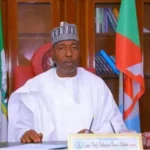Stakeholders in the education sector have expressed worry over the fate of the education system in Nigeria. They are therefore calling for more scrutiny and intervention in the search for a sustainable policy toward achieving global best practices in the sector.
They stated the stance when they converged for the monthly talk series of the Nigeria Muslim Forum United Kingdom (NMFUK) – a UK-registered charity organization, alongside stakeholders in the education sector including the Bauchi State governor, vice chancellor of Federal University Dutse (FUD), among other seasoned academics, to discuss issues besetting the country’s tertiary education coverage.
With ‘The Challenges of Education Subsidy Removal: What Way Forward? as theme, the meeting was a result of moves by the federal government to remove subsidy on education, a development many describe as a way to hasten the crippling of the education sector, especially the tertiary institutions.
Speaking on how tertiary institutions can survive with adequate funding and the future of the sector, the Vice Chancellor, Federal University Dutse (FUD), Professor Abdulkarim Mohammed, decried how the system is currently crawling at a time the federal government is mulling the decision to stop helping the sector.
NAHCO to invest billions in equipment
Cybersecurity awareness antidote to online crimes – NITDA
He said: “The most pressing issue is, how do we fund these universities? Not only the students on a wider scale. How do we convince the government to fund the institutions adequately?
“This issue of removal of subsidy is serious. As I am talking, already students don’t pay tuition fees in all government institutions. They are only paying service charges. When the government removes tuition fees, it means universities will have to charge students tuition fees. How do we do that when the students cannot even pay registration fees? We need to see it from a wider perspective,” he said.
He said: “If they insist on removing it, then the universities should be empowered to be self-sufficient. There are countries that are far ahead of us in terms of everything but did not remove subsidy on education. They are still pumping money into research, infrastructure and the rest. In our own case, it is not like that.
“How do we do with universities that are new, and that are still struggling? How do they get up when the subsidy is removed? It is not even the time to talk about this,” he said.
He further stated that while his university has a student benevolent fund, which is used to take details of those who are unable to pay registration fees, currently, there are a number of students who have written to them after following the procedures.
“We know that there is money in the country; there are sectors that are still wallowing in money and everyone knows. There should be priorities in the country. The problem is that our priority in the country is not education or health.
“Which country will say there is no money to fund education? We know how much money this country is getting and how much individuals are carting away from the coffers of the government,” he said.
He maintained that some universities will be shut down so far as there is no resolution of this issue.
On his part, the Bauchi State Governor, Bala Muhammad, lamented how education is in a state of dilapidation and faulted the decision of the federal government to remove subsidy on education.
He said the rate of out-of-school children in his state, coupled with issues of students from less privileged families, was challenging to the extent that the government was having a tough time dealing with them.
“For us at state government level, the federal government will sit with labour unions and chart policies or decisions that become problems for us and you all know that we don’t even realize tax in the North, which before used to go a long way in dealing with some issues,” he said.
“We are at a stage where education is in a dilapidated state in Nigeria, especially in the North. The rate of out-of-school children is high. Parents cannot afford to pay for education not to talk of paying for an increase. We don’t even value the importance of education.”
He further noted that before the child of the poor would go to school and end up getting three to four job offers but today, the child of a tomato seller will tax himself to go to school but end up with not even a single job and as a result they are no longer seeing the importance thereby being discouraged.
“Just two days ago, our university here said that they have 7,000 students that they need us to intervene for because they couldn’t pay their registration fees, which is not more than N30,000.
“We paid the scholarship but even at that, it is not sufficient. The federal government must see to this by not bringing policies that are not positive to us. It is not right.”
The governor further revealed that Bauchi State spent 22 per cent of its budget on education, which is still not sufficient as 1.7 million children are out of school. Some schools are in a dilapidated state and children are just roaming about helpless despite building 5000 classes in four years and could only rescue 500,000 out-of-school children, he stated.
Others who spoke were the chairman of the event, Dr Bala Muhammad, Professor Kabiru Dandago, all from Bayero University Kano, the moderator, Suleiman Ibrahim, and the host, Sheikh Abdul-Razaq Ibrahim, among others.
How we are rescuing students from dropping out of school – Dr Farida Shehu Azare
Dr Farida Shehu Azare from the Institute of Islamic Banking and Finance, Bayero University Kano highlighted how students are suffering to make ends meet as they faced extreme hardship trying to pay their registration fees.
She shared a narrative of her encounter with some students that subsequently led to starting an initiative aimed at helping students stay afloat.
“I am a lecturer and we mingle with students. These children are mostly from less privileged families. If you hear someone’s story and how he or she is managing to study, you will shed tears. I just wish policymakers were here to hear some of these stories,” she said.
She said: “On the issue of payment of registration fee alone and to meet deadline, the students are really struggling and facing extreme hardship. The issue of subsidy removal has brought tertiary institutions into intense situations, they are also suffering.
“It started here with three students who reached out to me. They couldn’t pay their registration fees. I met with a coordinator and right then, I met a student who had received a letter of suspension of his studies. He was a Level 4 student. When I read his letter, it was based on financial grounds.
“I then asked his coordinator, and he confirmed that the boy was averagely a good student and his performance was good enough. I asked him who was paying his school fees and he said no one had ever paid his school fees.
“He already had N40,000 and needed about N97,000. So, he is going to look for the balance and return next session. That really touched me and, I suppose, all coordinators will have the same issue.”
She further said: “I then said to him if I brought the balance can he bring the N40,000 and he replied yes. When I went back home and opened a WhatsApp group on 1st August and sent a message about how students were struggling. All thanks to God my contacts cooperated and we were able to rescue that boy. We called the initiative “Edu Rescue.”
She revealed that through the initiative, between 1st August and 7th October, they raised N14,305.783 and rescued 141 students from dropping out.
“We requested the students to at least pay the previous registration fees then we would balance up. We don’t give them the money due to lack of trust and someone can collect from several people.
“So, we collect the money and go to the bank and pay. The bank also cooperated by helping to generate the remittal, processed and sent back the receipt to me after which I sent it back to them.”
According to her, they also reached out to parents via phone calls to confirm and to avoid them from also collecting from them.
“I then started linking up with coordinators who are close to the students to identify those needing assistance. We later involved class reps and other individuals to identify those in need. Someone will even come with as much as N90,000 and just need a little to top up,” she said.
While noting that there are stories behind the struggles of the students, she said most of them are tasking themselves while others laboured hard to raise money.
“There is a female student who works as a housemaid after classes all to make ends meet. Some of them even exercise fear that they don’t know me, that I can run away with their money. I asked these to liaise with their coordinators. Let these children at least get their first degrees.”
Meanwhile, Daily Trust observed that all this is coming at a time when Bayero University Kano and other federal universities in northwestern Nigeria enjoyed interventions from their state governors, politicians and philanthropists with respect to payment of registration fees for hundreds of students.

 Join Daily Trust WhatsApp Community For Quick Access To News and Happenings Around You.
Join Daily Trust WhatsApp Community For Quick Access To News and Happenings Around You.


